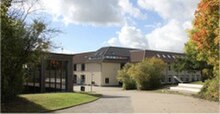Hermann-Vöchting-Gymnasium
| Hermann-Vöchting-Gymnasium | |
|---|---|

|
|
| type of school | high school |
| School number | 168658 |
| address |
Ostring 14 |
| place | Blomberg |
| country | North Rhine-Westphalia |
| Country | Germany |
| Coordinates | 51 ° 56 '53 " N , 9 ° 6' 11" E |
| carrier | City of Blomberg |
| student | about 900 |
| Teachers | about 80 |
| management | Michael Hanke |
| Website | www.gymnasium-blomberg.de |
The Hermann-Vöchting-Gymnasium Blomberg ( HVG , formerly Städt. Gymnasium Blomberg) is the only grammar school in the city of Blomberg in the Lippe district in North Rhine-Westphalia . Its catchment area also extends to the southeast of Lippe. It is currently attended by around 900 students, who are taught, educated and supervised by around 80 teachers and employees in the open all-day and administration. The grammar school, which is part of the school center in Blomberg, is headed by senior studies director Michael Hanke.
School motto
Challenge - Diversity - Community
Namesake of the school
When Hermann Vöchting (1847-1917), the namesake of the Blomberger school since 2006, is a biologist and botanist . As the son of the city, he attended the rector's school in Blomberg, a forerunner of today's Hermann-Vöchting-Gymnasium.
history
The history of the Blomberger Gymnasium and especially its predecessor schools is sometimes difficult to reconstruct, as many documents of the town's history were lost in the course of the destruction of the town in 1447 during the Soest feud . From 1459, however, the employment of a Blomberg schoolmaster can be documented. With the Lippe church order in 1571, which was supposed to organize the school system in Lippe after the Reformation, the so-called sexton schools or 'German' schools were established. In addition to this sexton school, which could be attended by girls and boys, there was also a Latin school in Blomberg after 1571, which was reserved for boys. The next generation of clergymen and officials should be trained in the Latin school. The Latin school, from which the Rector's School developed, prepared its students for theology studies, but also for philosophical and legal studies.
Until the Thirty Years War , the former Augustinian monastery only housed the Latin school (which emerged from the monastery school), while the German schools often changed their location. After the war, Count Johann Bernhard zur Lippe gave the city of Blomberg the heavily dilapidated monastery and the adjacent poor house. From 1651 onwards, lessons could take place in these rooms. According to the inscription, a rector's house was built in the Seligen Winkel in downtown Blomberg in 1708. The purpose of this house was to accommodate the principal of the small school and to serve as a teaching facility. After three or four years of teaching, many students at the Blomberg Rector School switched to a grammar school in the surrounding towns and then started studying.
At the turn of the 20th century, around 30 students were being trained in the Rector's School. In 1884, in Blomberg, parallel to the Rector's School, in which only boys were taught, an "upscale girls' school" was founded. However, it was dissolved in 1913 and merged with the Rector's School. This school was later expanded into a Progymnasium, where one could already acquire the secondary school leaving certificate.
On November 20, 1953, the new building of the municipal high school in Blomberg was inaugurated. Until then, the Blomberg students who wanted to attend upper school had to commute to Detmold, Lemgo or Bad Pyrmont, since the Progymnasium in Blomberg only offered the way to school up to the secondary school leaving certificate. In 1954 the city administration applied for it to be expanded to a full high school. This was approved and in 1959 the Progymnasium with the establishment of an 11th grade became a full high school, which in the same year accepted the school leaving examination for the first time. In the following years a school center developed around the grammar school and some new buildings and extensions were built (secondary school 1970, specialist class wing 1971, sports hall 1972, swimming pool 1973, special school 1976, extension building and large multi-purpose room in 1999). In 2013, 1956 pupils visited the Blomberg school center, which now consists of the Hermann-Vöchting-Gymnasium as well as a secondary and special school. There are also a secondary school and a secondary school, which will expire in summer 2019.
In 2006, the municipal high school in Blomberg was renamed the Hermann-Vöchting-Gymnasium after students, parents and teachers had dealt with various proposals in a lengthy process and finally voted with a clear majority for the botanist as the namesake.
Educational offers
From grade 5 onwards, the Hermann-Vöchting-Gymnasium sets up an English bilingual profile class that leads to the bilingual Abitur and can also include the CertiLingua excellence label . There is also a fan profile in grades 5 and 6. From grade 8 in the middle and upper grades, the school offers further options so that every direction of talent can find its school path. English is taught as the first foreign language; in grade 6 you can choose between Latin and French as a second foreign language. In the compulsory elective area of grades 8 and 9, the students can choose Spanish, French or a two-hour course with a scientific, mathematical-technical, artistic-performing or sporting or linguistic-social science focus as a third foreign language, so that in addition to STEM and the languages social and sporting talents are encouraged.
In the upper level, the range of subjects is expanded to include computer science, educational science, social sciences, law and philosophy. Advanced courses take place in German, English, mathematics, physics, chemistry, biology, history, geography and social sciences. In addition to the further development of educational concepts for the individual subjects, the school program sets the following interdisciplinary priorities: career orientation, media education, health education and method learning.
At the grammar school, after the introductory phase, one can acquire the secondary qualification I with the technical college entrance qualification (Mittlere Reife), after the qualification phase 1 the school part of the technical college entrance qualification, after the qualification phase 2 with the Abitur finally the general university entrance qualification. The grammar school thus offers direct and usually shortest access to all professions and courses.
At the Hermann-Vöchting-Gymnasium there are two choirs - a lower school choir and a student-parent-teacher choir, a wind group, a young band and a big band. Annual summer and Christmas concerts have been a tradition for decades. Teachers, parents and former students also take part in the choir and the big band. Permanent offers outside of the subject-related lessons are u. a. various working groups in sport, a chess group, the school medical service and a glider flying group and numerous offers in the MINT area. In addition, the Hermann-Vöchting-Gymnasium offers a bilingual course.
Partner schools
The school has contacts in the following countries:
- Denmark exchange with Egaa-Gymnasium Aarhus
- Poland exchange with Lyceum IX in Olsztyn
- France exchange with the Collège St. Louis Lieusaint
- England exchange with the Ridgeway Academy in Redditch (near Birmingham)
Former students
- Frank-Walter Steinmeier (* 1956), Abitur 1974, Federal President
- Klaus Geise (Acting Mayor of the City of Blomberg - Abitur 1978)
- Norbert Wolff (* 1962), Abitur 1980, theologian and church historian
- Linda Stahl (* 1985), Abitur 2005, javelin thrower
Cooperations / networks
- European school in NRW since 2018 (bilingual high school with Certilingua excellence label, partner schools in England, Poland, France and Denmark)
- MINT-ec school since 2016, recertified in 2020
- Reference school in the NRW future schools network
- School without racism / school with courage
- Member of the zdi-Zentrum Lippe.MINT (promotion of young talent in the field of science / technology)
- Cooperation with the Luftsportgemeinschaft Lippe-Südost eV (aviation enthusiasts are introduced to the sport of gliding.)
- The sport of handball is firmly anchored at the Hermann-Vöchting-Gymnasium. As a "partner school for competitive sports in North Rhine-Westphalia", the girls and young women at HSG Blomberg-Lippe receive special support and handball school teams benefit from the support of HSG trainers.
- Phoenix Contact (cooperation agreement under the patronage of Mayor Klaus Geise in many projects and classes. For example, high school students can get to know the basics of electrical engineering in theory and practice in the Phoenix Contact training workshop.)
Awards
- CertiLingua label of excellence
- Seal of Quality for Lions Quest
- School without racism - school with courage
- Full member of the MINTeC network
literature
- Historical department of the Natural Science Association for the Principality of Lippe (ed.): Messages from Lippe history and regional studies , Meyerschen Hofbuchdruckerei publishing house, Detmold 1908.
- Kohl, Wilhelm; Balzer, Manfred; Veddeler, Peter: Westphalian history: The 19th and 20th centuries: Economy and society , Schwann Verlag, 1982.
- Städtisches Gymnasium Blomberg (Ed.): 30 years of Gymnasium am Ostring. Latin school since the Middle Ages , Blomberg 1983.
Web links
Individual evidence
- ↑ school management. In: hvg-blomberg.de. Retrieved April 19, 2020 .
- ^ Hermann-Vöchting-Gymnasium Gymnasium of the city of Blomberg. In: www.schulministerium.nrw.de. Ministry of Schools and Education of the State of North Rhine-Westphalia , accessed on April 19, 2020 (entry school database).
